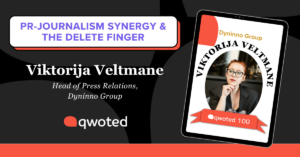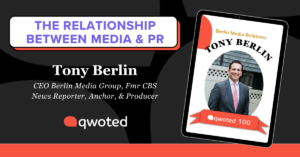Qwoted is committed to exploring the current state of the media by speaking to industry leaders and educating future generations of media professionals. What has social media and technological innovation brought to the table? What can we expect for the future of journalism?
Since 1981, Joanne Cleaver has covered several beats as a newspaper staff editor and a freelancer journalist, including entrepreneurship, personal finance, investing, retirement planning, and women’s economic issues. She has authored seven nonfiction books, the most recent being The Career Lattice (McGraw Professional, 2012). Additionally, Cleaver manages major research projects that equip associations to advocate for women in their industries. She currently or has contributed to a wide variety of outlets, including USNews.com, Crain’s Chicago Business and New York Business, The Chicago Tribune, The Los Angeles Times, and many others.
What advice would you give to aspiring young writers and reporters?
JC: Going deep with your strengths is great career advice for anyone, but is especially critical for journalists. When deciding on a beat, find a topic – not a cause – that is deep enough to sustain a long run of work, so you can follow the arc of change. And don’t confuse journalism with advocacy. Advocates make change. Journalists report about the change.
What are some of the best practices from journalism’s past that you feel need to be utilized now?
JC: Nothing replaces a one-on-one interview – listening for what isn’t said reveals the real story. And for the love of god, fact-check.
What do you see as some of journalism’s biggest potential pitfalls?
JC: Impatience with readers is a fatal flaw. People blame the media often because they are disenfranchised and frustrated. Listening to people when they are most difficult to hear reveals breaks in trust due to faulty process and culture. Journalists are in the business of being correct, but there are many ways to be right, and we need to cultivate respect with and for our readers.
Social media has upended the traditional media landscape. One of the great challenges it creates is authenticity and malevolent actors. How do think journalists and reporters should deal with the rising tide of misinformation?
JC: The public does not know how journalism is accomplished. More transparency and humility around this process will result in more public trust. Social media is useful for understanding the zeitgeist and journalists can use it to provide the ‘story behind the story,’ which many find fascinating.
Which aspects of your work do you find most rewarding?
JC: Drilling down to the underlying drivers and dynamics is my favorite part of reporting. You have to define the dots before you can connect them! I love interviewing and writing, and it’s most rewarding to hear how my work has helped readers and clients navigate their careers and finances.



